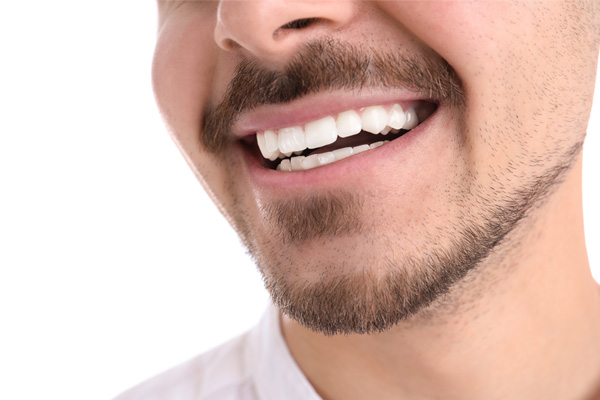3 Tips for Adjusting to New Dentures

If you are the proud owner of new dentures, you may wonder what the adjustment period will be like. Although dentures replace missing teeth and give you an improved smile, they do take a little while to get used to. For many people, it can take up to a month to feel comfortable wearing them and feeling confident out in public. The key is to set realistic expectations and be patient during the adjustment phase.
Tips for adjusting
It is normal to have some gum irritation as you get used to wearing your new dentures. When your dentures are first placed, the dentist will make any adjustments that will assist in the right fit. However, as the dentures adjust to your mouth, you may need to go back in for additional adjustments if you continue to have mouth sores.
1. Experiment with adhesives
One of the common issues new wearers have with dentures is that they have difficulty staying in place. Using adhesives is one way to adjust and prevent major slippage. Adhesives come in gels and strips, and there are various ones available. Your dentist may be able to give you a recommendation, or you may want to be prepared to try a few different ones before you find the right adhesive for your needs.
The need for adhesives probably will not last forever. As the muscles in your mouth and cheeks get used to the dentures, you will more than likely discover that you can use less or none at all, and your dentures will still stay in place.
2. Learn to eat with them
Eating is another issue at the beginning. For the first few days or so, stick to soft foods. Examples include smoothies, mashed potatoes, jello, pudding, oatmeal, pureed fruits, eggs, and soup. As you get more used to eating with your dentures, you can begin to add in more solid foods such as rice, cooked veggies, pasta, and fish.
It helps to cut up food into small pieces and chew evenly on both sides. Even when you are ready to eat normally, there are some foods to avoid, as they can damage the dentures. Stay away from sticky, hard, and chewy foods.
3. Practice speaking
When you wear dentures, you will probably discover that it is more difficult to pronounce certain sounds than others. During the adjustment time, practice speaking out loud at home and in front of a mirror. Some people also find that singing smooth phrases at a slower pace helps with speech training. If your dentures seem to slip as you begin to speak, it may help to bite down and swallow before speaking, as this returns the dentures to their proper position.
FAQs
In addition to adjusting to new dentures, there are several other things to consider. This miniature FAQ section may help you to make better decisions about your denture process.
What can I eat the day I get new dentures?
Because your gums will still be very sensitive as you get used to your new dentures, you will need to eat only soft foods on the first day that you wear them. Typically, items such as ice cream, pudding, and mashed potatoes are preferable.
Can I take out my dentures for a while if they hurt?
While you can take out your dentures whenever you choose (and are encouraged to do so at night), it is important to keep in mind that the longer and more often you wear them, the easier it will be for your body to adjust to them.
How long will it be before I can resume eating and normal activity?
Most people return to their regular food items and activity levels by the end of a 30-day period. After a month, you should be able to eat all of your favorite foods again and participate in all of your favorite activities.
Do dentures last forever?
Unfortunately, dentures do not last forever. Depending on the level of use, you will need to have your dentures replaced every 5-10 years. The better you take care of them, the longer they will last.
Conclusion
Eventually, you will appreciate your dentures for their ability to help you speak and eat normally. However, there is an adjustment period in which you and your gums need to get used to them. Following these tips should make the process easier.
Request an appointment here: https://www.thanasasdds.com or call Thanasas Family Dental Care at (248) 260-2878 for an appointment in our Troy office.
Check out what others are saying about our dental services on Yelp: Dentures and Partial Dentures in Troy, MI.
Recent Posts
Dentures replace missing teeth and restore smiles. While they are an excellent option for effectively treating tooth loss, they also have a reputation for moving around, falling out, and causing frustration for their wearers. Dentists have worked hard over the past few decades to improve the look and feel of artificial teeth, but they still…
Considering dentures? Read on to learn more about the process of getting dentures. Tooth extraction is, at times, necessary before getting dentures. However, dentists only recommend tooth extraction before getting dentures when doing so is absolutely necessary.This review discusses when tooth extraction is necessary before getting dentures, along with a broader overview of what dentures…
For centuries, people have used dentures to replace missing teeth. The fact that they are still in use today speaks to how practical and effective they can be. Dentures are a popular option for those who are missing multiple teeth and do not have the desire or the ability to undergo extensive dental work. Developments…
If you are missing many teeth, you might be wondering if you should choose to get dentures. If you are missing multiple teeth, you might go for partial dentures. On the other hand, if you are missing most of your teeth, you might want to go for full dentures. These are often easy to take…


